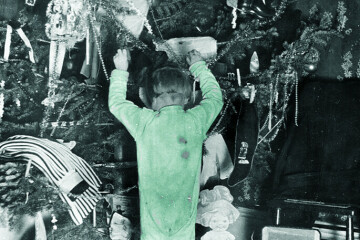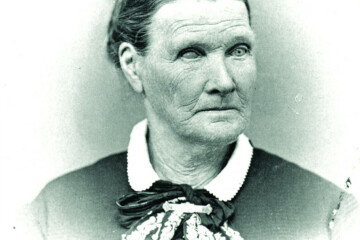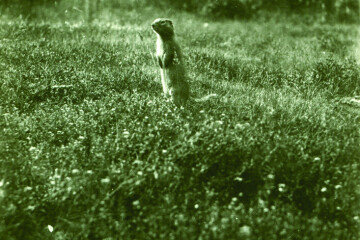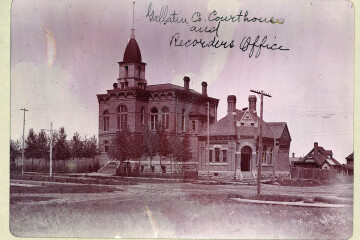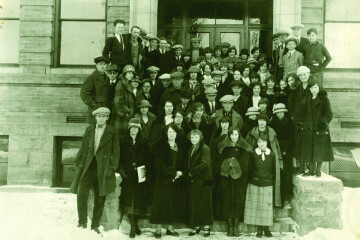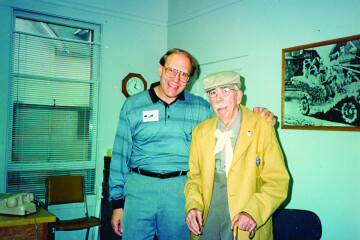“I never intended to be a teacher.” Bessie Gee’s Story

Occasionally, people embark on a rewarding, life-long career that was never part of their original plan. Educators like Margaret “Bessie” Gee fall into this category. Bessie was born in 1900 to Maude Morgan and Hugo John Gee on the family farm at Reese Creek, north of Bozeman. As a child, Bessie attended the one-room school at Reese Creek, unaware that one day she would teach in rural country schools. Bessie’s humorous, rocky start to teaching turned into nearly fifty years spent as a local educator. In the following 1975 oral history interview excerpt, Bessie relates the misadventures she experienced during her first two days as a teacher in a rural Gallatin County School.
“Well, I never intended to be a teacher. It was the spring of 1919. I had graduated from high school and there was no money to send me to college, so I was living with my parents on the family home near Belgrade. My chum, Meda Becker, who had graduated from high school when I did, took a teaching position at the school where my brothers and sisters and I had gone to elementary school [Reese Creek School]. She was boarding at our house. It was right after World War I, and there was a very great shortage of teachers. The shortage was so great that some of the students who had graduated from high school were going out to teach in rural schools.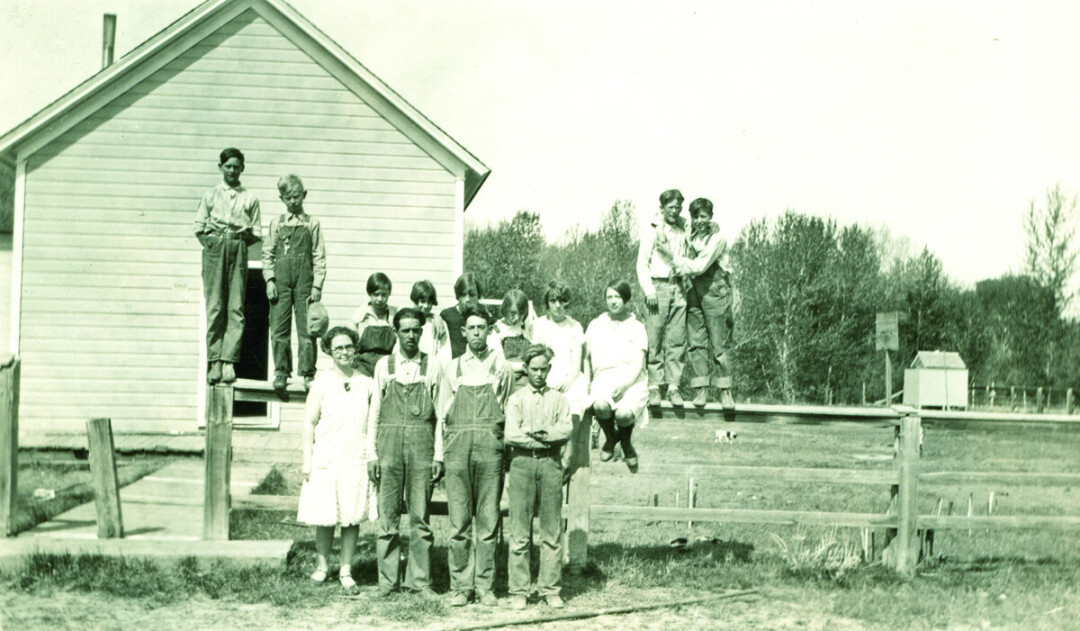
The County Superintendent needed a teacher for a new rural school at Clarkston. Clarkston was a railroad station stop about ten miles north of Logan, on the Missouri River. Meda told her [the superintendent] that I might be available. She told me that if I took the position, she would get me a temporary certificate until the next teacher’s examination. It was November of 1920. I was to go by train, right after Election Day. The train would leave on Wednesday. I’d only have to teach Thursday and Friday; I could come back home on the train for the weekend.
Now, I had never intended to teach, and I didn’t know anything about what books students should have. Meda made a list of what subjects and what books I might be able to use in different grades, and then she gave me her Montana course of study. Mother helped me to wash and starch and iron all the pieces of clothing that a young lady was supposed to wear in those days – camisoles, petticoats, skirts, blouses, corset covers and so forth. She gave me enough money to buy a ticket to Clarkston and to come back on the Friday evening train.
We had always lived in the country and seldom had any money to spend – our mother or dad bought what we needed – and I really wasn’t prepared to go out into the world alone. I was scared stiff at the thought of taking that train and going down to Clarkston by myself! Mother took me into town [Bozeman] and left me with my sisters. My younger sister [Nan] was to see I was off on the train. But when I got to the train, I just couldn’t bear to go alone, so I asked my younger sister to go with me. She was in high school, and she could come back [to Bozeman] the next morning on the train, and mother and dad wouldn’t know anything about it. I bought two tickets and we boarded the train in Bozeman. We had gone past Belgrade when it suddenly came to my mind that I had bought two tickets and mother had only given me money for two. [Bessie’s own fare to Clarkston and another fare for her return trip on Friday] There wouldn’t be any money left for Nan to get back to school. We were both in a panic – we didn’t know what to do. I was looking around the train rather wildly and I saw a little old lady who lived near Belgrade. Some of dad’s relatives had married into her family and we always called her ‘Grandma Penwell.’ I went over to her and told her my whole tragic story and asked her if I could borrow one dollar so that Nan could get back to school the next morning. She was a kind and understanding person, so she said, ‘Well, I’ll give you two dollars.’ And she never told my mother or dad about it, and we did pay her back.
The train reached Clarkston in the late afternoon and we got off onto a wooden platform in front of a small station house. We were told to go over to the section house that was a short way along the track. Clarkston consisted of a station house, a section house where the railroad workers boarded and roomed when necessary, and a store that contained a post office – part of that building was used as living quarters. The new schoolhouse wasn’t very far from the store. Across the tracks to the north was a farmhouse where the children I was to teach lived. We went to the section house and an old woman opened the door. She was the one that cooked for the men. With her was a little old four-year-old [child]. They both were so dirty that their clothes, had you taken them off, would have stood alone. She told me I was to go and board at the house across the tracks.
We picked up my suitcase and went across the tracks. The house was lovely, and the door was opened by a very nice, spotlessly clean lady [Mrs. August Rohla] and she asked us into the house. It was nice and clean, and her children were well-dressed. She regretfully explained to us that the room I was to use wasn’t quite ready. The chairman of the board, Mr. Stockton, would put me up for the first night and my own room would be ready the next day. Mrs. Rohla said that Mr. Stockton lived about a mile down the track. We were young country girls and we didn’t think anything of walking in the evening.
We picked up my suitcase and started back for the tracks. It was getting late, almost sundown, and it wasn’t very warm. Soon we came in sight of a lovely big log house against the cliff. Just about the time we reached the house, a huge dog rushed out, barking loudly. I was scared to death of the dog, so we dropped the suitcase and swiftly climbed the pole-corral fence. Mr. Stockton came out and found the new teacher and her sister sitting on top of the rail fence in most undignified positions. He took us into the home, up wide front steps and into a large living room with a high-beam ceiling and a huge fireplace with a cheerful fire. He was very apologetic but explained that he couldn’t put us up for the night, as his wife had taken sick. He told us to go back up the tracks to the section house and tell the proprietress to give us supper and a room for the night.
By that time it was dark, but a clear, starry night. We picked up my suitcase and started up the track to the section house. Oh my, that old woman was mad! We told her that Mr. Stockton had said for her to feed us and give us a bed. She said she didn’t have a bed, but she slammed down on the table a dish of cold, greasy fried potatoes, opened a can of greasy sardines, and poured two cups of bitter black coffee out of the coffee pot that had been sitting on the stove for days, I think. We didn’t drink coffee. Suddenly she said ‘Well, one of the section hands is gone tonight. You can have his bed.’
That bed was the dirtiest I’d ever seen. Dirty pillow, no pillow slip, two dirty quilts, no sheets. He must have been sleeping in it for months like that. We didn’t think of bedbugs, and we took off our middies and skirts and our high-laced shoes and decided to make the best of it. From my suitcase we took out my nice clean starched underwear and covered the dirty pillow and our heads with corset covers. Then we took the clean petticoats and wrapped our arms and hands in those, got in between those filthy quilts, and tried to go to sleep. Several times during the night trains went by and woke us up. We didn’t get a very good night’s sleep.
In the morning I guess we had something for breakfast, but I don’t remember what. Nan took the train back to Bozeman and high school. I went across the tracks to the Rohla home and left my suitcase. Then I went over to the new schoolhouse. I think it was about eighteen by twenty feet, maybe a little larger, and everything in it was brand new. There was a large new heater in one corner and two small cloak rooms on either side of the front door. On two walls there were large slate blackboards, and the other wall had several windows. The floor was hardwood – a lovely white oak. Out back of the school were the two regulation little houses [outhouses], and in front of the school was a very tall flagpole, just as straight as could be.
Mr. Stockton said he would take me to Pole Gulch [a nearby school] to get some books for the schoolhouse because there were no books or supplies at the new building. He had an old automobile and we went a little more than five miles up a gulch. Just before we reached the school building, there was a steep little hill. We were supposed to go up the hill and down the other side, where the schoolhouse was in a hollow. As we started up the incline, he stripped the gears of his car. After sitting there a moment or two, he said there was nothing we could do about it but walk back to Clarkston. But first, we would go on up to the schoolhouse so I could select the books and supplies I would need for teaching.
Now Meda told me I would need readers, spellers, arithmetic texts, histories, and hygiene books. I started selecting books as if I knew what I was doing. Mr. Stockton looked around and found four water pails – two large and two somewhat smaller. We packed the books and supplies into these. He took the two large pails and I took the two smaller ones, and we walked all the way back to Clarkston. I thought that walk would never end. We got back a little after noon on Thursday. After I had eaten lunch at my nice clean boarding house, the Rohla children and I went to the schoolhouse and unloaded the books and supplies.
I held school for a short time on Thursday afternoon, and all-day Friday but I can’t remember one single thing about what I taught. All I can remember is ringing the hand bell, looking at the course of study, and seeing that dirty little four-year-old girl sitting in one of the seats.
I took the late afternoon train home on Friday. When I reached Belgrade, my oldest brother met me and said there had been two bad accidents at home. My youngest brother, who was in the seventh grade, and Meda, who was teaching at the school, rode horseback a mile-and -a-half to school. That Friday morning, they decided to race the last quarter mile to the schoolhouse. My brother’s saddle was not cinched tightly. It rolled and threw him off, but his boot caught in the stirrup and the horse dragged him a short way. His head was badly cut from broken glasses. The pony stopped as quickly as she could. A man in a field nearby came and helped get Stuart’s foot out of the stirrup.
Meda started on her horse for the nearest house with a telephone. She was going so fast, when she turned the corner going into the lane to their house, her horse fell and broke Meda’s leg. She started to crawl to the house, but the folks saw her and they called mother, and got her into the house. When my older brother got home, the doctor was there, sewing up the gashes in my younger brother’s head. Meda was sitting in a chair with her leg in pillows, waiting for my brother to take her to Bozeman, where her family lived. I went with them, but on the way I wrote a note to the Clarkston School Board saying I could not return to teach school because of the accident.
What I taught in that day-and-a-half is a total blank in my mind, and thus ended my first attempt at teaching.”
Despite her initial hardships, Bessie Gee stuck with her education career. She attended the State Normal School in Dillon, Montana, and later Montana State University. Bessie taught at several country schools in Gallatin County, including Monforton, Springhill and Cottonwood, before working as a librarian for the Bozeman School District. She retired in 1969 and lived on the Gee family farm at Reese Creek until she passed away in 1993.

